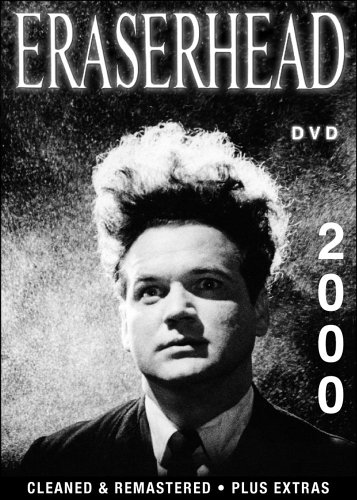All Nonfiction
- Bullying
- Books
- Academic
- Author Interviews
- Celebrity interviews
- College Articles
- College Essays
- Educator of the Year
- Heroes
- Interviews
- Memoir
- Personal Experience
- Sports
- Travel & Culture
All Opinions
- Bullying
- Current Events / Politics
- Discrimination
- Drugs / Alcohol / Smoking
- Entertainment / Celebrities
- Environment
- Love / Relationships
- Movies / Music / TV
- Pop Culture / Trends
- School / College
- Social Issues / Civics
- Spirituality / Religion
- Sports / Hobbies
All Hot Topics
- Bullying
- Community Service
- Environment
- Health
- Letters to the Editor
- Pride & Prejudice
- What Matters
- Back
Summer Guide
- Program Links
- Program Reviews
- Back
College Guide
- College Links
- College Reviews
- College Essays
- College Articles
- Back
Eraserhead
Wow. For the first time in a very, very long time, I've found a film that I'm not sure that I entirely "got". On its most basic level, Eraserhead appears to be nothing more than a series of randomly assorted images with a main character thrown into the mix. These images are so bizarre and so perplexing that many fans have come up with a multitude of theories as to what this film symbolizes. From the easy-to-spot ideas (fear of adulthood) to the utterly bizarre (a twisted account of the birth of Christ?), the theories alone should prove to audience members how infamously bizarre Eraserhead is.
If there is a narrative to this film, it's incredibly minimalist. We follow an awkward publisher, Henry Spencer, in a world of countless factories and urban decay. Currently "on vacation", Henry must deal with the number of problems arising around him - his relationship with his girlfriend, the birth of their mutant baby, his hallucinations of a "rosy-cheeked" woman appearing in his radiator, and the seductive nature of his sexy neighbor.
I'd be lying if I said that the narrative in this film makes much sense. Filled to the brim with bizarre, and oftentimes sickening, images, the film seems more concerned with creating a bizarre atmosphere than anything else. I won't comment on the film's narrative but I will, however, leave several interpretations of this film with this review. None are definitive or 100% without fault, but they're certainly some of the more popular beliefs.
Interpretation 1 - The film is about the fears of adulthood and the responsibilities that come with it. Throughout the film, we're subjected to Henry's utter anxiety about the world that's growing up around him. His girlfriend's moving in, he has a baby, and he has (or had) a job to worry about, The pressures of society are caving in on Henry, and it's this anxiety that creates the film's atmosphere.
Interpretation 2 - The film is a twisted account of Joseph's view of the birth of Christ. To Joseph, the birth of this child "without an earthly father" is completely alien to him (hence the baby's disgusting appearance). He's alienated, confused, and unsure of himself, the future of his baby, and what part both of them have to play in the world. The "angels" (the woman in the radiator) try to comfort him, but this only further disturbs Joseph/Henry. In this interpretation, the "man in the planet" is God, and the sperm we seeing flying around after he's pulled a lever is what inseminates his wife, Mary (which is actually the name of the character in this film).
Interpretation 3 - The film is about the guilt of adultery. At the beginning of the movie, we see Henry praying to God for his forgiveness, and "God" forgives Henry via pulling the levers in the planet. What was Henry repenting of? Adultery. As it's implied - and seen later on - Henry has, perhaps, had multiple affairs with his girlfriend's mother and the seductive woman in Room 26. Mary's crying and disgusted by this child because this child may not be Henry's. It's even implied that Henry's never even had sex with Mary before, as he's reluctant to answer the question posed by Mary's mother. Was he avoiding the question because he didn't want to be revealed as the "cause" of the baby's birth? Or did Henry not want to admit that the child wasn't even his to begin with?
As you can see, this film can be taken in many different ways. However, is it possible that ANY of these theories are true, or even close to the truth? Is it not possible - nay *probable* - that the random images in this film are, in actuality, just that? Just random images that we give undeserved depth to? Is this film a piece of surreal art, or is it a heap of random images meant to seem as art? Whatever the case, you can't argue that the film's impressive on a technical level, and that it certainly creates a disturbing and sickening atmosphere. Stanley Kubrick, who's made some of the most conceptually and symbolically complex films of all-time, once listed Eraserhead as one of his favorite films, which only further shrouds the authenticity of this film.
Whether or not you'll like Eraserhead is extremely difficult to say. I'm not even sure if I liked it! I'm sure I'll watch this film again one day - in hopes of finally understanding the film's bizarre and quirky nature. Until then, however, I can only say that the film is "an experience", to say the least.
Similar Articles
JOIN THE DISCUSSION
This article has 0 comments.

